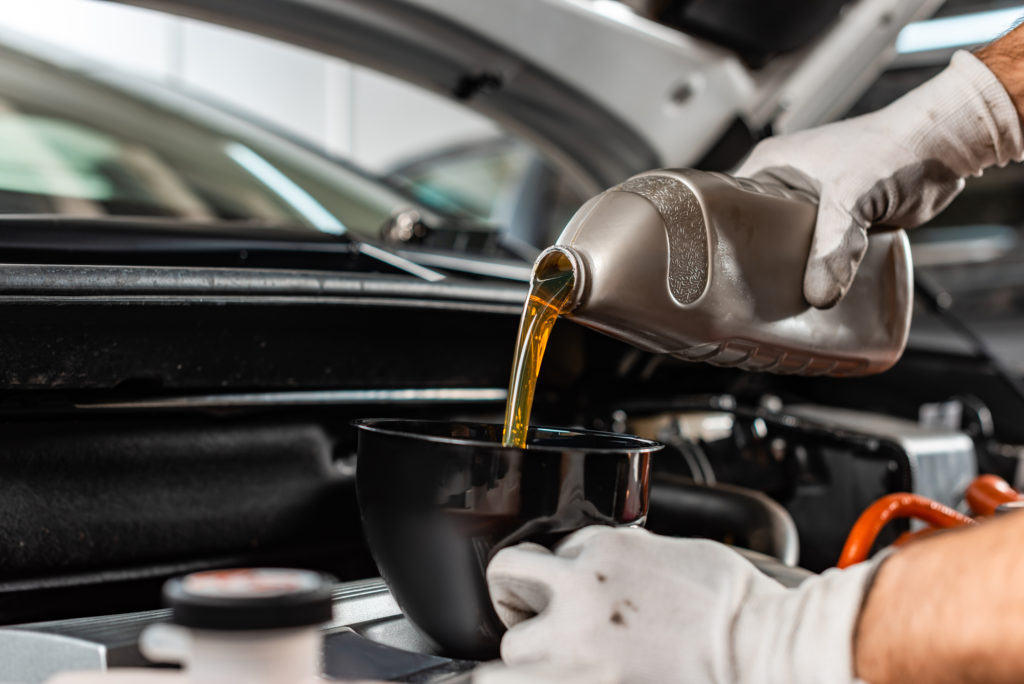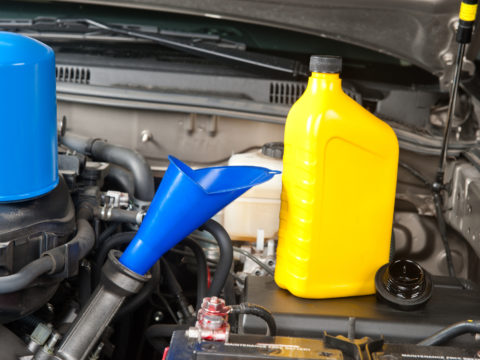Engine oil is the lifeblood of your car. However, there is so much to know about choosing the right motor oil for your vehicle. It needs to be the proper viscosity, or thickness, to do its job properly.

If you are trying to decide between 10W-40 and 10W-30 motor oil for your car, we’ve got the information you need to make the best decision for your vehicle.
Contents
What Is the Difference Between 10W-40 and 10W-30?
The main difference between 10W-40 and 10W-30 motor oil is the viscosity of the oil at different temperatures. Viscosity is the measure of how thick or thin a liquid is, and it affects the flow of oil in your engine.
The higher the number after the “W,” the thicker the oil will be. Thicker oil, like 10W-40, is better for high temperatures because it won’t thin out as much as thinner oil, like 10W-30.
This means that 10W-40 will better protect your engine at higher temperatures.
What Does 10W-40 Mean?
The “10W” in 10W-40 motor oil stands for the oil’s viscosity level at low temperatures. The “40” stands for the oil’s viscosity at high temperatures. The “W” stands for Winter, which also refers to cold temperatures.
What Does 10W-30 Mean?
The first number, 10, refers to the oil’s viscosity at low temperatures, and the second number, 30, refers to the oil’s viscosity at high temperatures. The main difference between the oils is their viscosity at high temperatures, which refers to how thin they become when heated up.
10W-40 and 10W-30 Oil Differences Explored
Thicker oil is also better for older engines because it can help to prevent leaks. However, more viscous oil can also make your engine work a little harder, and it can increase fuel consumption.
Thinner oil is better for newer engines because it flows more easily and helps to keep the engine clean. Thinner oil can also help to improve fuel economy.
The main difference between the two oils is that 10W-40 is better for high temperatures and older engines, while 10W-30 is better for newer engines and improved fuel economy.
The higher the viscosity level, the more the oil remains thick at high temperatures. The thickness of the 10w-40 gives your engine more protection against wear at high temperatures. It is ideal for individuals who have high mileage vehicles and drive them regularly in hot climates.
The thinner 10w-30 is a good option for those who have newer vehicles or live in cooler climates. However, the longer one has the same car, the more one will benefit from switching to 10W-40.
Notable 10W-40 Oil Features
Here are some notable 10w-40 features.
Overall Performance
10W-40 motor oil has a better overall performance when compared to 10W-30 motor oil. This is because it can maintain its viscosity better at high temperatures, which will provide better protection for your engine.
Composition
10W-40 oil is made of a higher quality petroleum hydrocarbon with additives, which gives it a better ability to resist high temperatures and degradation.
Oil Pressure
Regarding oil pressure, 10W-40 motor oil has a slight advantage over 10w-30 motor oil. Engines that use the 10W-40 oil tend to have consistent normal oil pressure ratings.
Viscosity
The viscosity of 10W-40 motor oil is 10 at cold temperatures and 30 at high temperatures. The oil flows better when the engine is hot and focuses on sealing leaks to protect the engine.
Operating Temperature
The operating temperature of 10W-40 motor oil is -13 to 104 degrees Fahrenheit. This means that it can withstand extreme cold and hot temperatures without breaking down.
Mileage
The 10W-40 motor oil has a slight advantage over the 10W-30 motor oil when it comes to mileage. It can better resist high temperatures, which means that it will last longer. Cars that use this oil will get better performance and more miles long-term.
Average Price per Quart
The average price per quart for 10w-40 motor oil is about $5.

Notable 10W-30 Oil Features
Here are some notable 10w-30 features.
Overall Performance
While 10W-30 performs well overall, it does not have the same high-temperature protection as the 10W-40. This oil is better for those who live in cooler climates or have newer vehicles.
Composition
10W-30 oil is made of petroleum hydrocarbons as well. It doesn’t contain additives that increase its viscosity.
Oil Pressure
When it comes down to oil pressure, 10W-30 will cause oil pressure to be lower than 10W-40. Low oil pressure could indicate there’s not enough oil moving through the engine, which can cause other problems.
Viscosity
The viscosity of 10W-30 causes it to flow more efficiently when the engine is hot and does not provide as much protection against wear.
Operating Temperature Range
The operating temperature range for 10W-30 motor oil is -25 to 86 Fahrenheit.
Mileage
While the 10W-30 oil is great motor oil, it is not ideal for high mileage cars. It doesn’t seal leaks nor enhance overall performance and miles driven.
Average Price per Quart
The average price per quart for 10w-30 motor oil is about $3.50.
Pros and Cons of 10W-40 and 10W-30 Oil
Here is an easy chart on the pros and cons of 10W-40 and 10W-30.
| Pros | Cons | |
| 10W-40 | Better overall performance | Thicker oil can cause issues with oil pressure |
| Higher quality of base oil | More expensive | |
| More resistant to degradation | ||
| Can withstand extreme temperatures | ||
| 10W-30 | Lower oil pressure | Does not have as high of a temperature resistance |
| Flows more easily at high temperatures | Not as good for high-mileage cars | |
| Less expensive |
When to Use 10W-40 Oil
You should use 10w-40 oil in your car if:
- You have an older car
- You live in a hot climate
- You do a lot of stop-and-go driving
- You drive in dusty conditions
When to Use 10W-30 Oil
You should use 10w-30 oil in your car if:
- You have a newer car
- You live in a cooler climate
- You do mostly highway driving
- You don’t drive in dusty conditions
Which Is Better, 10W-40 or 10W-30?
Ultimately, it depends on your car and your driving habits. 10W-40 oil is better for high temperatures and older engines, while 10W-30 oil is better for newer engines and improved fuel economy.
Our recommendation is to go with the 10W-40 because it is an all-purpose oil that can withstand a wider range of temperatures. It protects your engine from leaks and wear and tear.
The goal is to give your car the oil it needs to perform the best over time. If you’re not sure which oil is best for your vehicle, ask a knowledgeable mechanic who knows a lot about the make and model of your specific car model.
Our Recommended 10-W40 and 10W-30 Brands
Here are the best 10w-40 brands.
Formula Shell Motor Oil
The Formula Shell Motor Oil is designed to protect your engine from harmful acids and deposits. It is also fortified with antioxidants to help protect your engine from wear and tear.
Valvoline High Mileage with MaxLife Technology
The Valvoline High Mileage with MaxLife Technology is a high-quality motor oil designed to help extend the life of your engine. It is formulated with seal conditioners to help prevent leaks, and it is also fortified with zinc additives to protect your engine from wear and tear.
Havoline Motor Oil
The Havoline Motor Oil is a high-quality motor oil designed to protect your engine from the wear and tear that comes from sludge deposits. It is also fortified with zinc and phosphorus additives to keep your engine running smoothly.
Here are the best 10w-30 brands.
Castrol GTX Motor Oil
The Castrol GTX 10w-30 motor oil is designed for high performance and protection. It meets and exceeds the requirements of all major engine manufacturers, and it is recommended for all types of vehicles.
Pennzoil Platinum Motor Oil
The Pennzoil Platinum 10W-30 motor oil is designed to clean up to 40 percent of engine sludge in the first oil change. It’s set to continuously keep your engine clean to keep it running like new.
Lucas Oil Hot Rod & Classic Motor Oil
The Lucas Oil Hot Rod & Classic Motor Oil is designed for high-performance vehicles. It’s a zinc/phosphorus formula that provides extra protection for engines with high miles.
FAQs
10W-30 or 10W-40 for summer?
The best option for summer driving is 10W-30 because it flows more easily in hot weather. However, if you live in a very hot climate or you have an older car, 10W-40 might be a better option to help protect your engine.
Can I use 10W-40 instead of 10W-30?
Yes, you can use 10W-40 oil instead of 10W-30 oil. However, keep in mind that 10W-40 oil is thicker and may make your engine work a little harder. It can also increase fuel consumption a little.
Can you mix 10W-30 and 10W-40?
Yes, you can mix 10W-30 and 10W-40 oils. However, it’s not recommended to mix oils unless your car’s owner’s manual specifically says to do so. Mixing oil weights can cause engine damage.
If you must mix oils, only mix a small amount of one with the other. For example, if you use 10w-30, do not use more than 50 percent 10w-40 oil in your engine.
Are 10W-30 and 10W-40 oils synthetic?
No, 10W-30 and 10W-40 oils are not synthetic. However, 10W-40 is considered semi-synthetic because its base is refined with crude oil and additives to make it thicker.
Also, some 10W-30 and 10W-40 oils brands are synthetic blends, which means they’re a mix of synthetic and conventional oils. Both oils are also available in full synthetic blends, which are great for older high mileage car engines.
Wrapping Up
10W-40 oil is better for high temperatures and older engines, while 10W-30 oil is better for newer engines and improved fuel economy. However, if you’re looking for an all-around better oil for your car, go with the 10W-40 because of its added benefits. If you have any other questions, feel free to leave a comment below!














